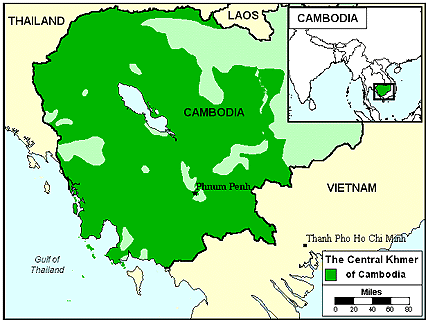|
|
Prayer Profile
The Central Khmer Cambodia
![[IMAGE]](../images4/0658.jpg) The Central Khmer inhabit the western and central portions of Cambodia, and make up 90% of the country’s total population. The Central Khmer speak an Eastern Mon-Khmer language called Khmer, or Cambodian. It is the national language of Cambodia.
The Central Khmer inhabit the western and central portions of Cambodia, and make up 90% of the country’s total population. The Central Khmer speak an Eastern Mon-Khmer language called Khmer, or Cambodian. It is the national language of Cambodia.
The Khmer Empire, which flourished between the ninth and thirteenth centuries, encompassed present-day Laos, Thailand, Cambodia, and southern Vietnam. Its power declined after being conquered by the Thai and the Vietnamese.
In 1969, Cambodia suffered bombings by the U.S. and invasions by the Vietnamese; events that threw the country into turmoil. In addition, a civil war broke out between the Cambodian government and Communist rebels known as the Khmer Rouge. Possibly three million Central Khmer died between 1975 and 1979, while the Khmer Rouge ruled. Since then, peace talks with the Khmer Rouge have failed, coups continue, and the Central Khmer still live in fear.
What Are Their Lives Like?
In 1975, the Khmer Rouge regime nearly destroyed Cambodia. In order to depopulate cities, three million people were forced into the countryside as slave labor. Starvation led to the deaths of over one million people. Currency was abolished; religion was eradicated; education was suspended; medicine was forbidden; and people who could read were often massacred all in the name of the ideal of rural social reform. Many people fled north to Thailand; others took the trail of tears into Communist Laos. Unfortunately, there they struggled to find clothing, shelter, medical care, and food. Some Khmer found permanent homes; others found shelter in crowded refugee camps.
Before the war, 90% of Cambodia’s inhabitants lived in one-third of the country, along the two main waterways and their tributaries. Although the soil there is not fertile, the plains flood every rainy season. The overflow brings an abundance of fish; and when it recedes, leaves rich deposits.
Sadly, bombing, civil war, and war with the Vietnamese decimated a once thriving agricultural economy. Today, most of the Khmer still live in small villages and grow rice in irrigated paddies. Rubber is also important to their economy. Unfortunately, it has been dangerous for the farmers to work the fields since the 1970’s (due to land mines). The mines have caused more wounds to the Central Khmer than any other weapon. In 1994, the United States provided military aid to help locate the mines and build new roads.
While the Khmer Rouge ruled Cambodia, more men died than women, creating a skewed sex ratio. Today, women are required to perform duties that were once done by men. They dress in colorful skirts, adding life to their unhappy environment. Red and white checkered cloth is used to make everything from headdresses to pouches for carrying babies.
In the villages, Buddhist rules of conduct maintain social control. These rules forbid lying, stealing, drinking alcoholic, committing adultery, and killing living creatures. Some remnants of traditional culture can be seen in the villages: folk dance, the classical royal ballet, and traditional Khmer music.
What Are Their Beliefs?
The former Khmer Empire was influenced by India, from which it adopted Hinduism and Buddhism. Today, 94% of the Central Khmer are Buddhist, although relics of ethnic religions such as ancestor worship (praying to deceased ancestors) and spirit worship are very important to them.
The Buddhist Khmer also seek the middle path to nirvana, or ultimate peace through gaining merit in this life. Merit may be gained through supporting the construction of Buddhist temples, giving food to monks, and studying in the monastery.
What Are Their Needs?
Although the Bible and other Christian resources are available to the Central Khmer, less than 1% of their population has turned to Christ. They remain a war-torn people in need of true, inner peace. Prayer is the key to reaching them with the Gospel.
Prayer Points
- Ask the Lord to call people who are willing to go to Cambodia and share Christ with the Central Khmer.
- Pray that God will grant wisdom and favor to the missions agencies that are currently working among the Central Khmer.
- Ask the Lord to begin revealing Himself to these precious people through dreams and visions.
- Pray that God will encourage and protect the Central Khmer who have accepted Jesus.
- Ask God to use these new converts to reach out and share the love of Christ with their own people.
- Take authority over the spiritual principalities and powers that are keeping the Khmer bound.
- Ask God to call forth prayer teams who will begin breaking up the soil through intercession.
- Pray that strong local churches will be planted among the Central Khmer.

See also the following Khmer Groups:
The Northern Khmer of Thailand;
The Cambodian of Laos;
The Central Khmer of Thailand; and
The Central Khmer of Vietnam
Statistics
Latest estimates from the World Evangelization Research Center.
THE PEOPLE
- People name: Central Khmer
- Country: Cambodia
- Their language: Khmer
- Population:
- Largest religion:
- Christians: <1%
- Church members: 10,448
- Scriptures in their own language: Bible
- Jesus Film in their own language: Available
- Christian broadcasts in their own language: Available
- Mission agencies working among this people: 7
- Persons who have heard the Gospel: 3,546,600 (45%)
- Persons who have never heard the Gospel: 4,490,000 (55%)
THEIR COUNTRY
- Country: Cambodia
- Population:
- Major peoples in size order:
- Major religions:
- Number of denominations: 12
© Copyright 1997
Bethany World Prayer Center
This profile may be copied and distributed without obtaining permission
as long as it is not altered, bound, published
or used for profit purposes.
![[HOME BUTTON]](../graphics/home.jpg)
![[CALENDAR BUTTON]](../graphics/calico.jpg)
![[LIST BUTTON]](../graphics/listico.jpg)
[Home]
[Calendar]
[Country List]
|